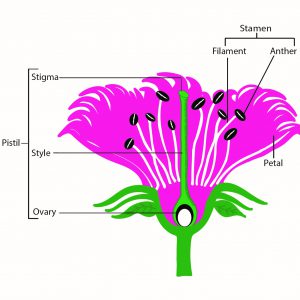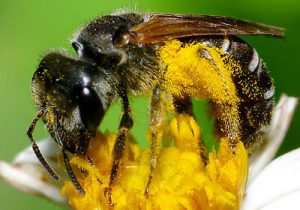Just like humans, plants require important things to grow and produce fruit. Many crops grown in Florida require sun, water, and nutrients to grow, but one thing many people forget about is pollination! Did you know that around one-third of our diet in the United States results directly from pollinators?
What is pollen?

Before we talk about pollination, we must first know what pollen is. Pollen is found within a flower and is a powdery, granular substance. It is usually yellow or orange and helps new plants grow. Pollen is the main source of protein, as well as some vitamins, minerals, and fats, for insects like honey bees.
What is pollination?

Pollination is the process of transferring pollen from male flower parts to female flower parts to produce fruits and seeds. Pollination occurs when a pollen grain from a flower’s male reproductive parts (anthers) are moved to the female part (pistil) of the same species. Once on the stigma, the pollen grain grows a tube that runs down the style to the ovary, where fertilization occurs, producing fruits or vegetables. Some crops can pollinate themselves, called a “complete” or “perfect” flower, and other must be pollinated through wind or pollinators. Corn for example, uses wind to carry pollen to female flowers, whereas watermelon depends on pollinators.
What are pollinators?

Pollinators are insects, birds, or bats that deliver pollen to female flowers. Honeybees are the most widely known pollinator, responsible for 25% of the world’s food production. As a bee climbs inside a male flower, pollen sticks to the hairs on the bee’s body due to static electricity produced during flight. Later, the bee will crawl into a female flower and the pollen will brush off onto the pistil, which houses the ovaries, to become fertilized.
Flowers have adapted over time to become more attractive to certain pollinators, such as different leaf size, scent, or color. In some cases, plants will produce flowers, but not fruit. This typically occurs due to pollination problems and is common in the squash family. Squash plants produce separate male and female flowers and require insects, such as bees, to transfer pollen adequately.
If you have questions about the pollination process or pollinators, feel free to call Sylvia Willis at the UF/IFAS Extension Office in Suwannee County at (386) 362-2771.
UF/IFAS is an Equal Opportunity Institution
 0
0
